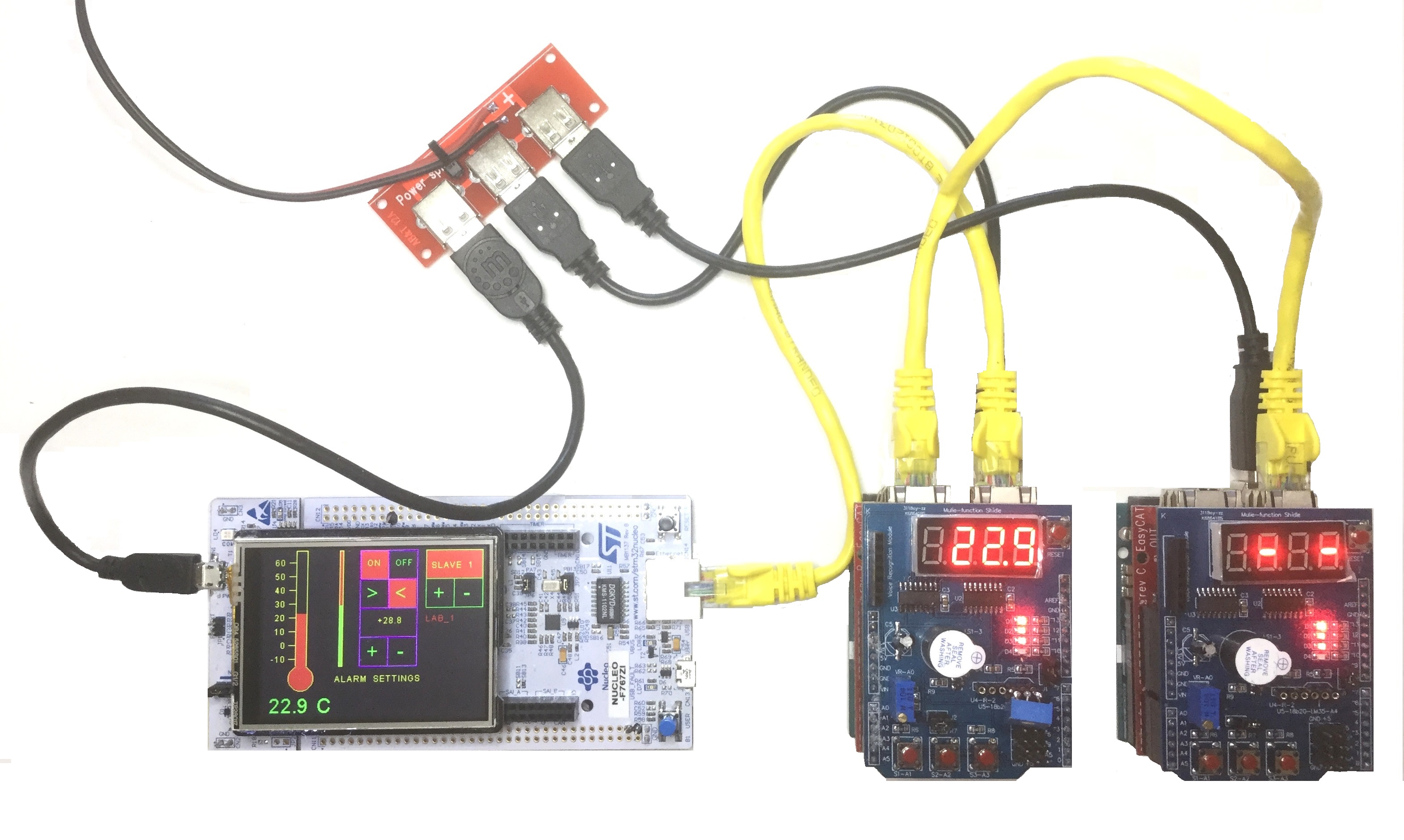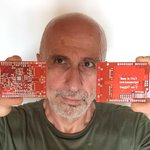SOEM EtherCAT Master library for STM Nucleo F767ZI
Dependents: EasyCAT_LAB_simple EasyCAT_LAB_very_simple EasyCAT_LAB
- This repository contains the SOEM (Simple Open EtherCAT® Master) library by rt-labs, that has been ported in the
 ecosystem by AB&T Tecnologie Informatiche.
ecosystem by AB&T Tecnologie Informatiche.
- It has been developed for the EasyCAT LAB , a complete educational and experimental EtherCAT® system, composed of one master and two slaves .
- The EasyCAT LAB is provided as a kit by AB&T Tecnologie Informatiche, to allow everybody to have an educational EtherCAT® system up and running in a matter of minutes.
Warning
- Currently only the Nucleo STM32F767ZI board is supported.

oshw/nicdrv.cpp
- Committer:
- EasyCAT
- Date:
- 2019-06-11
- Revision:
- 0:543d6784d4cc
File content as of revision 0:543d6784d4cc:
/*
* Licensed under the GNU General Public License version 2 with exceptions. See
* LICENSE file in the project root for full license information
*/
/** \file
* \brief
* EtherCAT RAW socket driver.
*
* Low level interface functions to send and receive EtherCAT packets.
* EtherCAT has the property that packets are only send by the master,
* and the send packets always return in the receive buffer.
* There can be multiple packets "on the wire" before they return.
* To combine the received packets with the original send packets a buffer
* system is installed. The identifier is put in the index item of the
* EtherCAT header. The index is stored and compared when a frame is received.
* If there is a match the packet can be combined with the transmit packet
* and returned to the higher level function.
*
* The socket layer can exhibit a reversal in the packet order (rare).
* If the Tx order is A-B-C the return order could be A-C-B. The indexed buffer
* will reorder the packets automatically.
*
* The "redundant" option will configure two sockets and two NIC interfaces.
* Slaves are connected to both interfaces, one on the IN port and one on the
* OUT port. Packets are send via both interfaces. Any one of the connections
* (also an interconnect) can be removed and the slaves are still serviced with
* packets. The software layer will detect the possible failure modes and
* compensate. If needed the packets from interface A are resent through interface B.
* This layer is fully transparent for the higher layers.
*/
#include "mbed.h"
#include <stdio.h>
#include <string.h>
#include "osal.h"
#include "oshw.h"
#ifndef MAX
#define MAX(a,b) (((a) > (b)) ? (a) : (b))
#define MIN(a,b) (((a) < (b)) ? (a) : (b))
#endif
/** Redundancy modes */
enum
{
/** No redundancy, single NIC mode */
ECT_RED_NONE,
/** Double redundant NIC connection */
ECT_RED_DOUBLE
};
/** Primary source MAC address used for EtherCAT.
* This address is not the MAC address used from the NIC.
* EtherCAT does not care about MAC addressing, but it is used here to
* differentiate the route the packet traverses through the EtherCAT
* segment. This is needed to find out the packet flow in redundant
* configurations. */
const uint16 priMAC[3] = { 0x0101, 0x0101, 0x0101 };
/** Secondary source MAC address used for EtherCAT. */
const uint16 secMAC[3] = { 0x0404, 0x0404, 0x0404 };
/** second MAC word is used for identification */
#define RX_PRIM priMAC[1]
/** second MAC word is used for identification */
#define RX_SEC secMAC[1]
//******************************************************************************
// driver used:
// \mbed-os-5.5.7\targets\TARGET_STM\TARGET_STM32F7\device\stm32f7xx_hal_eth.c
//******************************************************************************
GPIO_InitTypeDef GPIO_InitStructure;
ETH_HandleTypeDef hEth; // ethernet interface handle structure
ETH_DMADescTypeDef DMATxDescTab[ETH_TXBUFNB]; // dma tx descriptors
ETH_DMADescTypeDef DMARxDescTab[ETH_RXBUFNB]; // dma rx descriptors
uint8_t DmaTxBuff[ETH_TXBUFNB][ETH_MAX_PACKET_SIZE]; // dma tx buffers
uint8_t DmaRxBuff[ETH_RXBUFNB][ETH_MAX_PACKET_SIZE]; // dma rx buffers
HAL_StatusTypeDef HalStatus; // response from Hal functions
//------------------------------------------------------------------------------
void EthInit()
{
// HAL status codes
//
// HAL_OK = 0x00U,
// HAL_ERROR = 0x01U,
// HAL_BUSY = 0x02U,
// HAL_TIMEOUT = 0x03U
uint8_t MACAddr[6] = {0x12, 0x34, 0x56, 0x78, 0x9A, 0xBC}; // mac address
hEth.State = HAL_ETH_STATE_RESET; // don't know if it is useful !!!
hEth.Instance = ETH;
hEth.Init.AutoNegotiation = ETH_AUTONEGOTIATION_DISABLE;
hEth.Init.Speed = ETH_SPEED_100M;
hEth.Init.DuplexMode = ETH_MODE_FULLDUPLEX;
hEth.Init.PhyAddress = 0x00;
hEth.Init.MACAddr = &MACAddr[0];
hEth.Init.RxMode = ETH_RXPOLLING_MODE;
hEth.Init.ChecksumMode = ETH_CHECKSUM_BY_HARDWARE;
hEth.Init.MediaInterface = ETH_MEDIA_INTERFACE_RMII;
HalStatus = HAL_ETH_Init(&hEth);
NVIC_DisableIRQ(ETH_IRQn); // we don't use interrupt
if (HalStatus != HAL_OK)
{
printf ("HAL_ETH_Init err %d\n", HalStatus);
}
HalStatus = HAL_ETH_DMATxDescListInit(&hEth, &DMATxDescTab[0], &DmaTxBuff[0][0], ETH_TXBUFNB);
if (HalStatus != HAL_OK)
{
printf ("HAL_ETH_DMATxDescListInit err %d\n", HalStatus);
}
HalStatus = HAL_ETH_DMARxDescListInit(&hEth, &DMARxDescTab[0], &DmaRxBuff[0][0], ETH_RXBUFNB);
if (HalStatus != HAL_OK)
{
printf ("HAL_ETH_DMARxDescListInit err %d\n", HalStatus);
}
HalStatus = HAL_ETH_Start(&hEth);
if (HalStatus != HAL_OK)
{
printf ("HAL_ETH_Start err %d\n", HalStatus);
}
}
//------------------------------------------------------------------------------
int EthWrPacket (uint8_t* pBuff, uint16_t Len)
{
uint8_t* pDmaBuff;
if ((hEth.TxDesc->Status & ETH_DMATXDESC_OWN) == (uint32_t)RESET)
{
pDmaBuff = (uint8_t*)(hEth.TxDesc->Buffer1Addr);
memcpy (pDmaBuff, pBuff, Len);
HalStatus = HAL_ETH_TransmitFrame(&hEth, Len);
if (HalStatus != HAL_OK)
{
printf ("HAL_ETH_TransmitFrame err %d\n", HalStatus);
return NULL;
}
return Len;
}
else
{
return NULL;
}
}
//------------------------------------------------------------------------------
int EthRdPacket(uint8_t* pBuff)
{
int Len;
uint8_t* pDmaBuff;
HalStatus = HAL_ETH_GetReceivedFrame(&hEth); // check if a packet has been received
if (HalStatus == HAL_OK) // packet received
{
Len = hEth.RxFrameInfos.length; // packet lenght
pDmaBuff = (uint8_t*)hEth.RxFrameInfos.buffer; // DMA buffer pointer
memcpy (pBuff, pDmaBuff, Len); // read the data
// release the descriptor
hEth.RxFrameInfos.FSRxDesc->Status |= ETH_DMARXDESC_OWN;
hEth.RxFrameInfos.SegCount = 0; // reset segment count
return Len; // return the number of bytes read
}
else
{
return NULL; // no packet received
}
}
//*****************************************************************************
//
//*****************************************************************************
static void ecx_clear_rxbufstat(int *rxbufstat)
{
int i;
for(i = 0; i < EC_MAXBUF; i++)
{
rxbufstat[i] = EC_BUF_EMPTY;
}
}
/** Basic setup to connect NIC to socket.
* @param[in] port = port context struct
* @param[in] ifname = Name of NIC device, f.e. "eth0"
* @param[in] secondary = if >0 then use secondary stack instead of primary
* @return >0 if succeeded
*/
int ecx_setupnic(ecx_portt *port, const char *ifname, int secondary)
{
int i;
int rVal;
int *psock;
EthInit();
if (rVal != 0)
return 0;
if (secondary)
{
/* secondary port struct available? */
if (port->redport)
{
/* when using secondary socket it is automatically a redundant setup */
psock = &(port->redport->sockhandle);
*psock = -1;
port->redstate = ECT_RED_DOUBLE;
port->redport->stack.sock = &(port->redport->sockhandle);
port->redport->stack.txbuf = &(port->txbuf);
port->redport->stack.txbuflength = &(port->txbuflength);
port->redport->stack.tempbuf = &(port->redport->tempinbuf);
port->redport->stack.rxbuf = &(port->redport->rxbuf);
port->redport->stack.rxbufstat = &(port->redport->rxbufstat);
port->redport->stack.rxsa = &(port->redport->rxsa);
ecx_clear_rxbufstat(&(port->redport->rxbufstat[0]));
}
else
{
/* fail */
return 0;
}
}
else
{
port->sockhandle = -1;
port->lastidx = 0;
port->redstate = ECT_RED_NONE;
port->stack.sock = &(port->sockhandle);
port->stack.txbuf = &(port->txbuf);
port->stack.txbuflength = &(port->txbuflength);
port->stack.tempbuf = &(port->tempinbuf);
port->stack.rxbuf = &(port->rxbuf);
port->stack.rxbufstat = &(port->rxbufstat);
port->stack.rxsa = &(port->rxsa);
ecx_clear_rxbufstat(&(port->rxbufstat[0]));
psock = &(port->sockhandle);
}
/* setup ethernet headers in tx buffers so we don't have to repeat it */
for (i = 0; i < EC_MAXBUF; i++)
{
ec_setupheader(&(port->txbuf[i]));
port->rxbufstat[i] = EC_BUF_EMPTY;
}
ec_setupheader(&(port->txbuf2));
return 1;
}
/** Close sockets used
* @param[in] port = port context struct
* @return 0
*/
int ecx_closenic(ecx_portt *port)
{
if (port->sockhandle >= 0)
{
close(port->sockhandle);
}
if ((port->redport) && (port->redport->sockhandle >= 0))
{
close(port->redport->sockhandle);
}
return 0;
}
/** Fill buffer with ethernet header structure.
* Destination MAC is always broadcast.
* Ethertype is always ETH_P_ECAT.
* @param[out] p = buffer
*/
void ec_setupheader(void *p)
{
ec_etherheadert *bp;
bp = (ec_etherheadert*)p;
bp->da0 = oshw_htons(0xffff);
bp->da1 = oshw_htons(0xffff);
bp->da2 = oshw_htons(0xffff);
bp->sa0 = oshw_htons(priMAC[0]);
bp->sa1 = oshw_htons(priMAC[1]);
bp->sa2 = oshw_htons(priMAC[2]);
bp->etype = oshw_htons(ETH_P_ECAT);
}
/** Get new frame identifier index and allocate corresponding rx buffer.
* @param[in] port = port context struct
* @return new index.
*/
int ecx_getindex(ecx_portt *port)
{
int idx;
int cnt;
// mtx_lock (port->getindex_mutex); //******//
idx = port->lastidx + 1;
/* index can't be larger than buffer array */
if (idx >= EC_MAXBUF)
{
idx = 0;
}
cnt = 0;
/* try to find unused index */
while ((port->rxbufstat[idx] != EC_BUF_EMPTY) && (cnt < EC_MAXBUF))
{
idx++;
cnt++;
if (idx >= EC_MAXBUF)
{
idx = 0;
}
}
port->rxbufstat[idx] = EC_BUF_ALLOC;
if (port->redstate != ECT_RED_NONE)
{
port->redport->rxbufstat[idx] = EC_BUF_ALLOC;
}
port->lastidx = idx;
// mtx_unlock (port->getindex_mutex); //******//
return idx;
}
/** Set rx buffer status.
* @param[in] port = port context struct
* @param[in] idx = index in buffer array
* @param[in] bufstat = status to set
*/
void ecx_setbufstat(ecx_portt *port, int idx, int bufstat)
{
port->rxbufstat[idx] = bufstat;
if (port->redstate != ECT_RED_NONE)
{
port->redport->rxbufstat[idx] = bufstat;
}
}
/** Transmit buffer over socket (non blocking).
* @param[in] port = port context struct
* @param[in] idx = index in tx buffer array
* @param[in] stacknumber = 0=Primary 1=Secondary stack
* @return socket send result
*/
int ecx_outframe(ecx_portt *port, int idx, int stacknumber)
{
int lp, rval;
ec_stackT *stack;
if (!stacknumber)
{
stack = &(port->stack);
}
else
{
stack = &(port->redport->stack);
}
lp = (*stack->txbuflength)[idx];
(*stack->rxbufstat)[idx] = EC_BUF_TX;
rval = EthWrPacket ((*stack->txbuf)[idx], lp);
return rval;
}
/** Transmit buffer over socket (non blocking).
* @param[in] port = port context struct
* @param[in] idx = index in tx buffer array
* @return socket send result
*/
int ecx_outframe_red(ecx_portt *port, int idx)
{
ec_comt *datagramP;
ec_etherheadert *ehp;
int rval;
ehp = (ec_etherheadert *)&(port->txbuf[idx]);
/* rewrite MAC source address 1 to primary */
ehp->sa1 = oshw_htons(priMAC[1]);
/* transmit over primary socket*/
rval = ecx_outframe(port, idx, 0);
if (port->redstate != ECT_RED_NONE)
{
// mtx_lock (port->tx_mutex); //******//
ehp = (ec_etherheadert *)&(port->txbuf2);
/* use dummy frame for secondary socket transmit (BRD) */
datagramP = (ec_comt*)&(port->txbuf2[ETH_HEADERSIZE]);
/* write index to frame */
datagramP->index = idx;
/* rewrite MAC source address 1 to secondary */
ehp->sa1 = oshw_htons(secMAC[1]);
/* transmit over secondary socket */
//send(sockhandle2, &ec_txbuf2, ec_txbuflength2 , 0);
// OBS! redundant not ACTIVE for BFIN, just added to compile
port->redport->rxbufstat[idx] = EC_BUF_TX;
EthWrPacket((uint8_t*)&(port->txbuf2), port->txbuflength2);
// mtx_unlock (port->tx_mutex); //******//
}
return rval;
}
/** Non blocking read of socket. Put frame in temporary buffer.
* @param[in] port = port context struct
* @param[in] stacknumber = 0=primary 1=secondary stack
* @return >0 if frame is available and read
*/
static int ecx_recvpkt(ecx_portt *port, int stacknumber)
{
int lp, bytesrx;
ec_stackT *stack;
if (!stacknumber)
{
stack = &(port->stack);
}
else
{
stack = &(port->redport->stack);
}
lp = sizeof(port->tempinbuf);
bytesrx = EthRdPacket(*stack->tempbuf);
port->tempinbufs = bytesrx;
return (bytesrx > 0);
}
/** Non blocking receive frame function. Uses RX buffer and index to combine
* read frame with transmitted frame. To compensate for received frames that
* are out-of-order all frames are stored in their respective indexed buffer.
* If a frame was placed in the buffer previously, the function retrieves it
* from that buffer index without calling ec_recvpkt. If the requested index
* is not already in the buffer it calls ec_recvpkt to fetch it. There are
* three options now, 1 no frame read, so exit. 2 frame read but other
* than requested index, store in buffer and exit. 3 frame read with matching
* index, store in buffer, set completed flag in buffer status and exit.
*
* @param[in] port = port context struct
* @param[in] idx = requested index of frame
* @param[in] stacknumber = 0=primary 1=secondary stack
* @return Workcounter if a frame is found with corresponding index, otherwise
* EC_NOFRAME or EC_OTHERFRAME.
*/
int ecx_inframe(ecx_portt *port, int idx, int stacknumber)
{
uint16 l;
int rval;
uint8 idxf;
ec_etherheadert *ehp;
ec_comt *ecp;
ec_stackT *stack;
ec_bufT *rxbuf;
if (!stacknumber)
{
stack = &(port->stack);
}
else
{
stack = &(port->redport->stack);
}
rval = EC_NOFRAME;
rxbuf = &(*stack->rxbuf)[idx];
/* check if requested index is already in buffer ? */
if ((idx < EC_MAXBUF) && ( (*stack->rxbufstat)[idx] == EC_BUF_RCVD))
{
l = (*rxbuf)[0] + ((uint16)((*rxbuf)[1] & 0x0f) << 8);
/* return WKC */
rval = ((*rxbuf)[l] + ((uint16)(*rxbuf)[l + 1] << 8));
/* mark as completed */
(*stack->rxbufstat)[idx] = EC_BUF_COMPLETE;
}
else
{
// mtx_lock (port->rx_mutex); //******//
/* non blocking call to retrieve frame from socket */
if (ecx_recvpkt(port, stacknumber))
{
rval = EC_OTHERFRAME;
ehp =(ec_etherheadert*)(stack->tempbuf);
/* check if it is an EtherCAT frame */
if (ehp->etype == oshw_htons(ETH_P_ECAT))
{
ecp =(ec_comt*)(&(*stack->tempbuf)[ETH_HEADERSIZE]);
l = etohs(ecp->elength) & 0x0fff;
idxf = ecp->index;
/* found index equals requested index ? */
if (idxf == idx)
{
/* yes, put it in the buffer array (strip ethernet header) */
memcpy(rxbuf, &(*stack->tempbuf)[ETH_HEADERSIZE], (*stack->txbuflength)[idx] - ETH_HEADERSIZE);
/* return WKC */
rval = ((*rxbuf)[l] + ((uint16)((*rxbuf)[l + 1]) << 8));
/* mark as completed */
(*stack->rxbufstat)[idx] = EC_BUF_COMPLETE;
/* store MAC source word 1 for redundant routing info */
(*stack->rxsa)[idx] = oshw_ntohs(ehp->sa1);
}
else
{
/* check if index exist and someone is waiting for it */
if (idxf < EC_MAXBUF && (*stack->rxbufstat)[idxf] == EC_BUF_TX)
{
rxbuf = &(*stack->rxbuf)[idxf];
/* put it in the buffer array (strip ethernet header) */
memcpy(rxbuf, &(*stack->tempbuf)[ETH_HEADERSIZE], (*stack->txbuflength)[idxf] - ETH_HEADERSIZE);
/* mark as received */
(*stack->rxbufstat)[idxf] = EC_BUF_RCVD;
(*stack->rxsa)[idxf] = oshw_ntohs(ehp->sa1);
}
else
{
/* strange things happened */
}
}
}
}
// mtx_unlock (port->rx_mutex); //******//
}
/* WKC if matching frame found */
return rval;
}
/** Blocking redundant receive frame function. If redundant mode is not active then
* it skips the secondary stack and redundancy functions. In redundant mode it waits
* for both (primary and secondary) frames to come in. The result goes in an decision
* tree that decides, depending on the route of the packet and its possible missing arrival,
* how to reroute the original packet to get the data in an other try.
*
* @param[in] port = port context struct
* @param[in] idx = requested index of frame
* @param[in] timer = absolute timeout time
* @return Workcounter if a frame is found with corresponding index, otherwise
* EC_NOFRAME.
*/
static int ecx_waitinframe_red(ecx_portt *port, int idx, osal_timert timer)
{
int wkc = EC_NOFRAME;
int wkc2 = EC_NOFRAME;
int primrx, secrx;
/* if not in redundant mode then always assume secondary is OK */
if (port->redstate == ECT_RED_NONE)
{
wkc2 = 0;
}
do
{
/* only read frame if not already in */
if (wkc <= EC_NOFRAME)
{
wkc = ecx_inframe(port, idx, 0);
}
/* only try secondary if in redundant mode */
if (port->redstate != ECT_RED_NONE)
{
/* only read frame if not already in */
if (wkc2 <= EC_NOFRAME)
wkc2 = ecx_inframe(port, idx, 1);
}
/* wait for both frames to arrive or timeout */
} while (((wkc <= EC_NOFRAME) || (wkc2 <= EC_NOFRAME)) && (osal_timer_is_expired(&timer) == FALSE));
/* only do redundant functions when in redundant mode */
if (port->redstate != ECT_RED_NONE)
{
/* primrx if the received MAC source on primary socket */
primrx = 0;
if (wkc > EC_NOFRAME)
{
primrx = port->rxsa[idx];
}
/* secrx if the received MAC source on psecondary socket */
secrx = 0;
if (wkc2 > EC_NOFRAME)
{
secrx = port->redport->rxsa[idx];
}
/* primary socket got secondary frame and secondary socket got primary frame */
/* normal situation in redundant mode */
if ( ((primrx == RX_SEC) && (secrx == RX_PRIM)) )
{
/* copy secondary buffer to primary */
memcpy(&(port->rxbuf[idx]), &(port->redport->rxbuf[idx]), port->txbuflength[idx] - ETH_HEADERSIZE);
wkc = wkc2;
}
/* primary socket got nothing or primary frame, and secondary socket got secondary frame */
/* we need to resend TX packet */
if ( ((primrx == 0) && (secrx == RX_SEC)) ||
((primrx == RX_PRIM) && (secrx == RX_SEC)) )
{
osal_timert read_timer;
/* If both primary and secondary have partial connection retransmit the primary received
* frame over the secondary socket. The result from the secondary received frame is a combined
* frame that traversed all slaves in standard order. */
if ( (primrx == RX_PRIM) && (secrx == RX_SEC) )
{
/* copy primary rx to tx buffer */
memcpy(&(port->txbuf[idx][ETH_HEADERSIZE]), &(port->rxbuf[idx]), port->txbuflength[idx] - ETH_HEADERSIZE);
}
//osal_timer_start(&read_timer, EC_TIMEOUTRET);
osal_timer_start(&read_timer, 500);
/* resend secondary tx */
ecx_outframe(port, idx, 1);
do
{
/* retrieve frame */
wkc2 = ecx_inframe(port, idx, 1);
} while ((wkc2 <= EC_NOFRAME) && (osal_timer_is_expired(&read_timer) == FALSE));
if (wkc2 > EC_NOFRAME)
{
/* copy secondary result to primary rx buffer */
memcpy(&(port->rxbuf[idx]), &(port->redport->rxbuf[idx]), port->txbuflength[idx] - ETH_HEADERSIZE);
wkc = wkc2;
}
}
}
/* return WKC or EC_NOFRAME */
return wkc;
}
/** Blocking receive frame function. Calls ec_waitinframe_red().
* @param[in] port = port context struct
* @param[in] idx = requested index of frame
* @param[in] timeout = timeout in us
* @return Workcounter if a frame is found with corresponding index, otherwise
* EC_NOFRAME.
*/
int ecx_waitinframe(ecx_portt *port, int idx, int timeout)
{
int wkc;
osal_timert timer;
osal_timer_start (&timer, timeout);
wkc = ecx_waitinframe_red(port, idx, timer);
return wkc;
}
/** Blocking send and receive frame function. Used for non processdata frames.
* A datagram is build into a frame and transmitted via this function. It waits
* for an answer and returns the workcounter. The function retries if time is
* left and the result is WKC=0 or no frame received.
*
* The function calls ec_outframe_red() and ec_waitinframe_red().
*
* @param[in] port = port context struct
* @param[in] idx = index of frame
* @param[in] timeout = timeout in us
* @return Workcounter or EC_NOFRAME
*/
int ecx_srconfirm(ecx_portt *port, int idx, int timeout)
{
int wkc = EC_NOFRAME;
osal_timert timer;
osal_timer_start(&timer, timeout);
do
{
osal_timert read_timer;
/* tx frame on primary and if in redundant mode a dummy on secondary */
ecx_outframe_red(port, idx);
osal_timer_start(&read_timer, MIN(timeout, EC_TIMEOUTRET));
/* get frame from primary or if in redundant mode possibly from secondary */
wkc = ecx_waitinframe_red(port, idx, read_timer);
/* wait for answer with WKC>0 or otherwise retry until timeout */
} while ((wkc <= EC_NOFRAME) && (osal_timer_is_expired(&timer) == FALSE));
return wkc;
}
#ifdef EC_VER1
int ec_setupnic(const char *ifname, int secondary)
{
return ecx_setupnic(&ecx_port, ifname, secondary);
}
int ec_closenic(void)
{
return ecx_closenic(&ecx_port);
}
int ec_getindex(void)
{
return ecx_getindex(&ecx_port);
}
void ec_setbufstat(int idx, int bufstat)
{
ecx_setbufstat(&ecx_port, idx, bufstat);
}
int ec_outframe(int idx, int stacknumber)
{
return ecx_outframe(&ecx_port, idx, stacknumber);
}
int ec_outframe_red(int idx)
{
return ecx_outframe_red(&ecx_port, idx);
}
int ec_inframe(int idx, int stacknumber)
{
return ecx_inframe(&ecx_port, idx, stacknumber);
}
int ec_waitinframe(int idx, int timeout)
{
return ecx_waitinframe(&ecx_port, idx, timeout);
}
int ec_srconfirm(int idx, int timeout)
{
return ecx_srconfirm(&ecx_port, idx, timeout);
}
#endif

